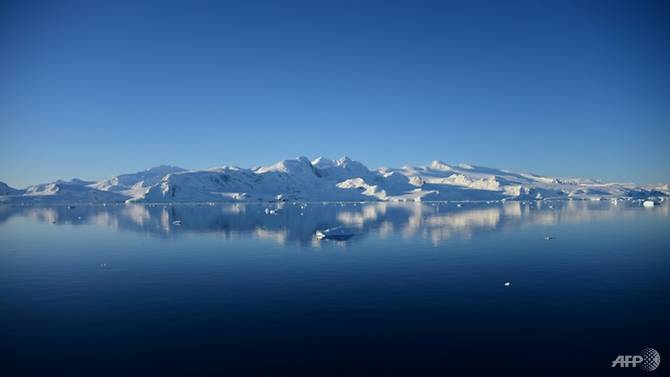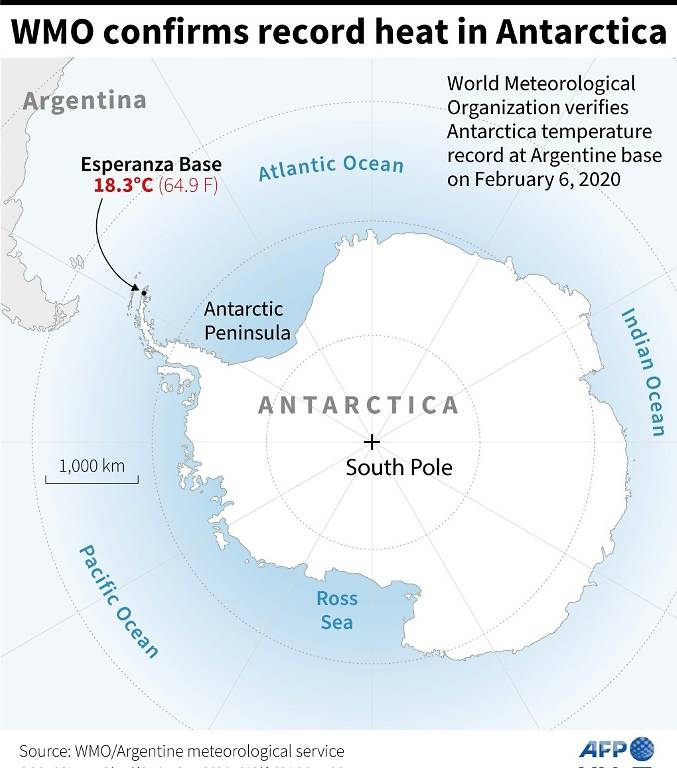November 28, 2025 | 01:25 GMT +7
November 28, 2025 | 01:25 GMT +7
Hotline: 0913.378.918
November 28, 2025 | 01:25 GMT +7
Hotline: 0913.378.918

"The Antarctic Peninsula is among the fastest-warming regions of the planet - almost 3 degrees Celsius over the last 50 years," warned the head of the UN's World Meteorological Organization.
The record heat was reached at Argentina's Esperanza research station on the Antarctic Peninsula on Feb 6, 2020, the UN's World Meteorological Organization said.
"Verification of this maximum temperature record is important because it helps us to build up a picture of the weather and climate in one of Earth's final frontiers," said WMO secretary-general Petteri Taalas.
"The Antarctic Peninsula is among the fastest-warming regions of the planet - almost 3 degrees Celsius over the last 50 years.
"This new temperature record is therefore consistent with the climate change we are observing."
The WMO rejected an even higher temperature reading of 20.75 degrees Celsius, reported on Feb 9 last year at a Brazilian automated permafrost monitoring station on the nearby Seymour Island, just off the peninsula which stretches north towards South America.
The previous verified record for the Antarctic continent - the mainland and its surrounding islands - was 17.5 degrees Celsius recorded at Esperanza on Mar 24, 2015.
The record for the wider Antarctic region - everywhere south of 60 degrees latitude - is 19.8 degrees Celsius, taken on Signy Island on Jan 30, 1982.
VERIFICATION PROCESS
In checking the two reported new temperature records, a WMO committee reviewed the weather situation on the peninsula at the time.
It found that a large high-pressure system created downslope winds producing significant local surface warming.
Past evaluations have shown that such conditions are conducive for producing record temperatures, the WMO said.
The experts looked at the instrumental set-ups and the data, finding no concerns at Esperanza.
However, an improvised radiation shield at the Brazilian station on Seymour Island led to a demonstrable thermal bias error for the permafrost monitor's air temperature sensor, making its reading ineligible to be signed off as an official WMO weather observation.
The new record at Esperanza will be added to the WMO's archive of weather and climate extremes.
The archive includes the world's highest and lowest temperatures, rainfall, heaviest hailstone, longest dry period, maximum gust of wind, longest lightning flash and weather-related mortalities.
The lowest temperature ever recorded on Earth was minus 89.2 degrees Celsius recorded at Vostok station in Antarctica on Jul 21, 1983.
GLOBAL WARMING CONCERNS

The World Meteorological Organization confirmed a record high temperature for Antarctica at the Esperanza Base on Feb 6, 2020.
Antarctica's average annual temperature ranges from about minus 10 degrees Celsius on the coast to minus 60 degrees Celsius at the highest parts of the interior.
"Even more so than the Arctic, the Antarctic is poorly covered in terms of continuous and sustained weather and climate observations and forecasts, even though both play an important role in driving climate and ocean patterns and in sea level rise," said Taalas.
The Earth's average surface temperature has gone up by 1 degrees Celsius since the 19th century, enough to increase the intensity of droughts, heat waves and tropical cyclones.
But the air over Antarctica has warmed more than twice that much.
Recent research has shown that warming of two degrees Celsius could push the melting of ice sheets atop Greenland and the West Antarctic - with enough frozen water to lift oceans 13 metres - past a point of no return.
"This new record shows once again that climate change requires urgent measures," said WMO first vice president Celeste Saulo, the head of Argentina's national weather service.
"It is essential to continue strengthening the observing, forecasting and early warning systems to respond to the extreme events that take place more and more often due to global warming."
AFP

(VAN) A new study reveals how the simultaneous effects of ocean acidification, salinity and loss of oxygen are making the world more fragile.

(VAN) Hopes are growing that the creation of the first 3D turkey gut model could be a turning point in the battle against the virulent blackhead disease.

(VAN) Tyson, America’s biggest meat supplier, plans to shutter one of its largest beef processing plants as the industry continues to struggle with low cattle supplies and political pressure from Washington.

(VAN) New FAO study shows how digital solutions are empowering farmers and fishers to prevent losses and build resilient agrifood systems.

(VAN) Brazil's COP30 presidency pushed through a compromise climate deal on Saturday that would boost finance for poor nations coping with global warming but that omitted any mention of the fossil fuels driving it.

(VAN) Poultry farmers in the UK have been warned that they could face one of the worst winters yet for bird flu.

(VAN) Prices of main-crop paddy have risen sharply, with jasmine rice hitting 16,100 baht per tonne — the highest level in years.